Swearer Center Ceremony Celebrates Induction of 2018 Society of Royce Fellows
2018 Royce Fellow Ricardo Jaramillo '18.5 presented his project abstract, "Towards a Humanizing Refugee Pedagogy."
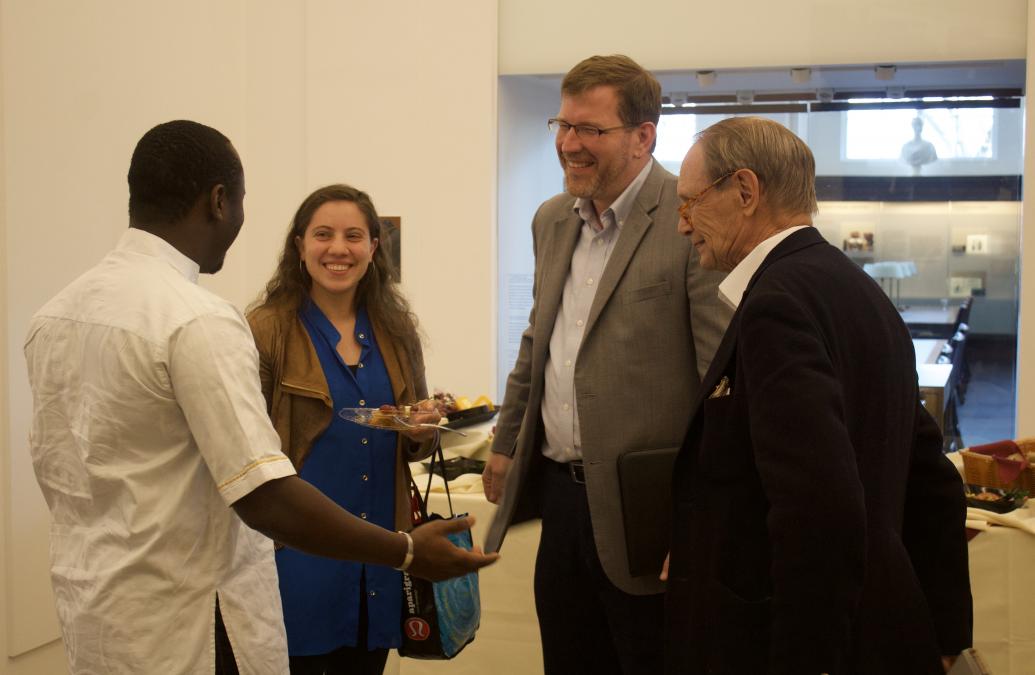
Students spoke with Swearer Center Executive Director Mathew Johnson and Charles Royce '61 (pictured, left to right) at the reception following the 22nd annual Royce Induction Ceremony.
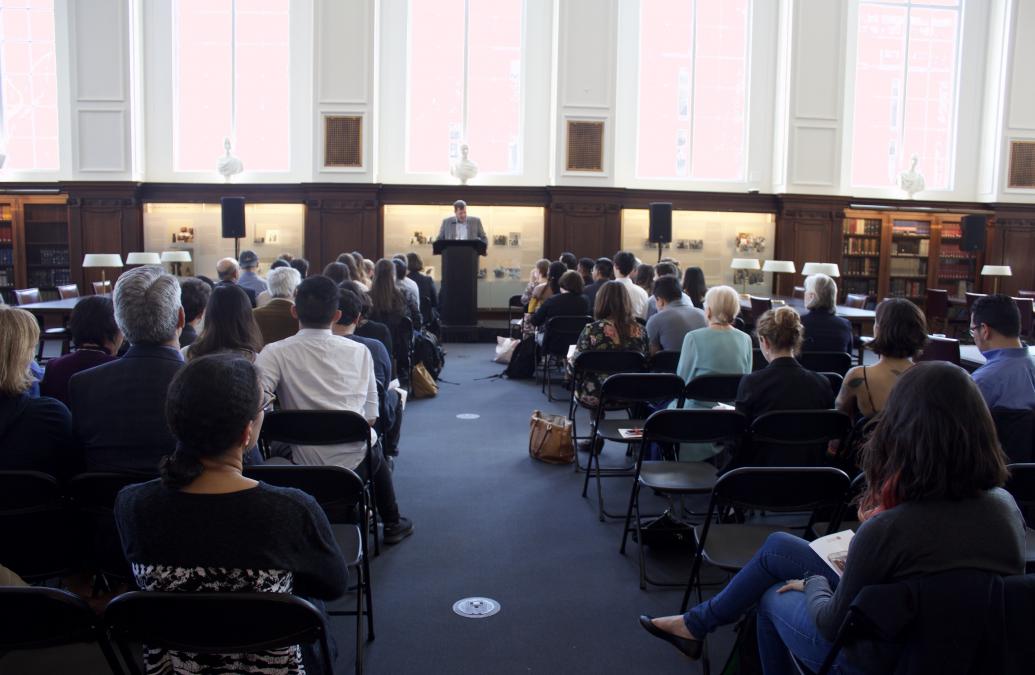
Swearer Center Executive Director Mathew Johnson addressed students, parents and friends at the 22nd annual Royce Induction Ceremony on April 26.
Royce Faculty Fellow and Assistant Professor of American Studies and Ethnic Studies Kevin Escudero introduced the incoming fellows at their induction ceremony on April 26.
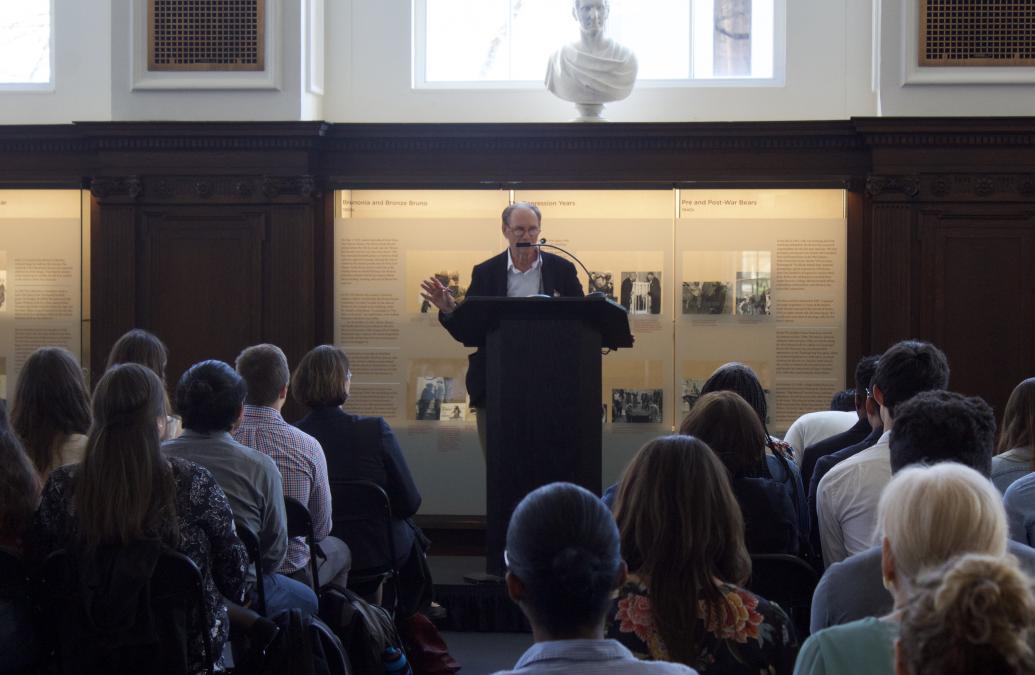
Charles Royce '61, founder of the Royce Fellowship, addressed the incoming fellows at their induction ceremony on April 26.
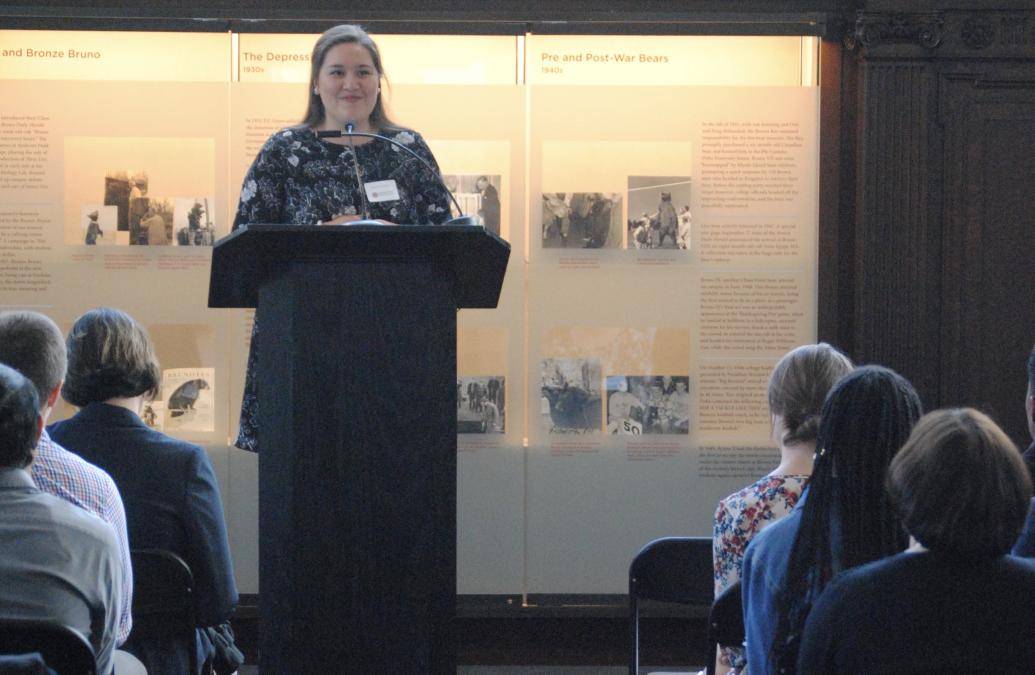
2018 Royce Fellow Patricia Rodarte ’19 presented her project abstract, "Examining the Impact of Primary Care Providers’ Perspectives on HIV Prevention in the U.S.-Mexico Borderland: Focus on El Paso, Texas"
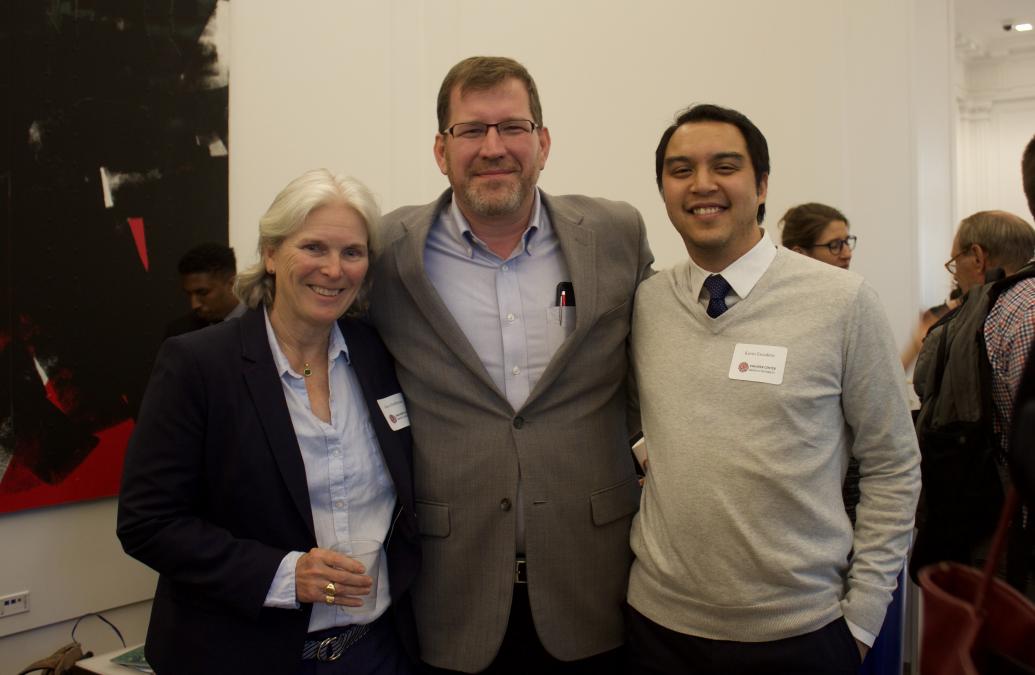
Director of the Global Sport Leadership Initiative and former Director of the Royce Fellowship and Kerri Heffernan, Swearer Center Executive Director Mathew Johnson and Royce Faculty Fellow Kevin Escudero (pictured, left to right) at the reception following the 22nd annual Royce Induction Ceremony.
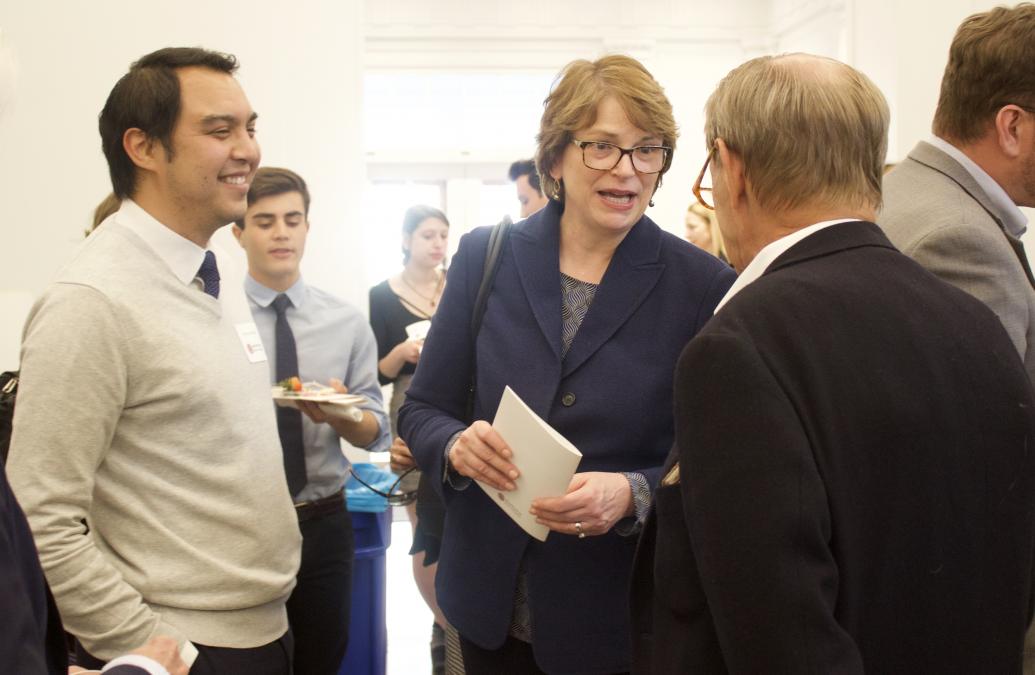
Royce Faculty Fellow Kevin Escudero, Brown President Christina Paxson and Charles Royce '61 (pictured, left to right) at the reception following the 22nd annual Royce Induction Ceremony.
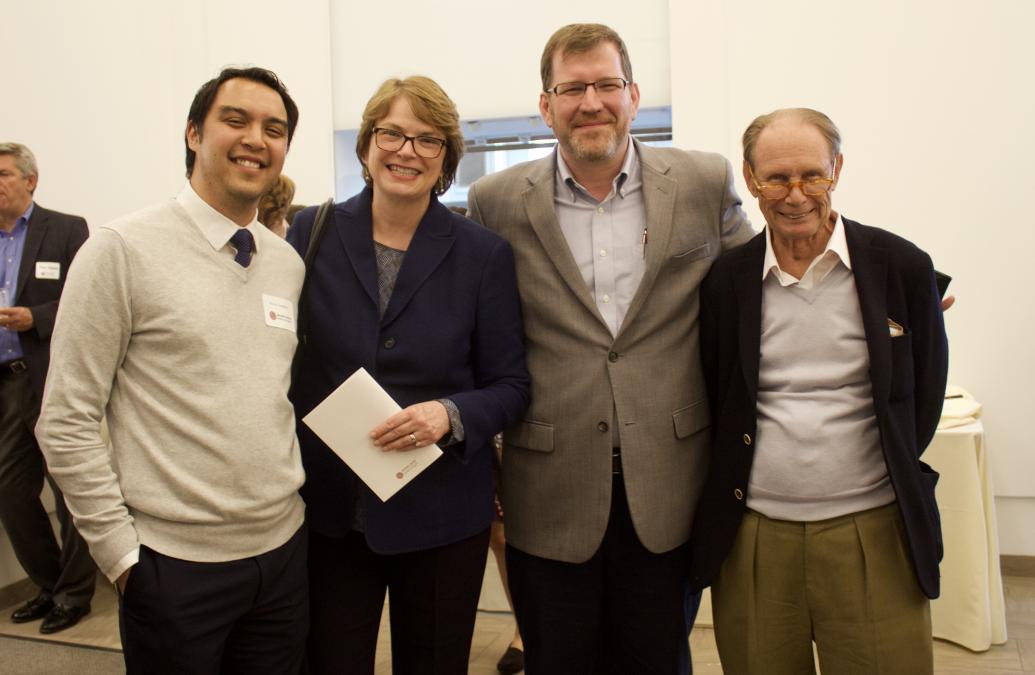
Royce Faculty Fellow Kevin Escudero, Brown University President Christina Paxson P'19, Brown University Associate Dean of Engaged Scholarship Mathew Johnson and Royce Fellowship Founder Chuck Royce '61 (pictured, left to right) at the reception following the 22nd annual Royce Induction Ceremony.
On Thursday, Apr. 26, the Swearer Center held the 22nd annual Royce Induction Ceremony at the John Hay Library. Each spring, more than 20 Brown students are inducted into the Society of Royce Fellows, a community of student scholars, faculty fellows and Royce alumni that offers a forum for reflection, inquiry and intellectual engagement within the university. Fellows also receive an award of $4,000 to pursue engaged research for projects of their own design over the summer, in both national and international locations. Established in 1996 through the generosity of Charles Royce '61, the program seeks to enable undergraduates to explore their developing interests and passions and to extend the ideals of Brown’s open curriculum beyond the walls of the University.
Swearer Center Executive Director Mathew Johnson welcomed the new cohort of Royce Fellows, including the Royce Sport and Society Fellows, highlighting the distinctive approach the program takes toward engaged scholarship and research. Mr. Royce then gave opening remarks, reflecting on the vast diversity of projects he has seen completed over the years.
Royce Faculty Fellow and Assistant Professor of American Studies and Ethnic Studies Kevin Escudero introduced the new fellows, who presented their project abstracts. This year's projects ranged from a photography-based project about the place of Asian-Americans in the deep South, to a qualitative assessment of the current standard of care of Autism Spectrum Disorder patients at Hasbro Children’s Hospital. The ceremony was followed by a reception, which Brown University President Christina Paxson attended.
Read more about the 2018 Royce Fellows' projects below, and see photos from the event above.
Norbesida Bagabila ’21
Concentration: Biomedical Engineering
Investigating the Beneficial Use of Plant-Based Medicines Through Combining Traditional African Medicine and Western Technology
Medicinal plants use as a mode of prevention and treatment of disease has origins in indigenous practice and has resurfaced in contemporary Western culture as herbal treatments, which are largely unregulated. While traditional medical systems had established oral protocols for safety and results, newer versions are plagued by a lack of intergenerational awareness of standard dosages and efficacy. The aim of this research is to assess the transferability of rudimentary indigenous methods to Western technologies, creating plant-based pills with standardized dosages and concentrations.
Advisor: Fred Jackson
Jesse Barber ’19
Concentration: Urban Studies
Belonging in Berkeley: A Historically Contextualized Spatial Ethnography
In investigating the social and political geography of Berkeley, California, Jesse will focus on a central question: How do “liberal” urban and social policies spatialize a sense of belonging in several sites in Berkeley? By analyzing the built environment of Berkeley and conducting interviews with residents, he will illustrate how belonging is shaped, accessed and restricted. Significant factors that Jesse expects to examine are a racialized history of and access to home ownership, the suburban ethic of single family homes and a practiced white liberalism that obscures certain forms of structural oppression.
Advisor: Josh Pacewicz
Colette Bare ’19
Concentration: Biomedical Engineering
Development of Bioreactor for Analyzing Effect of Flow on Engineered Vessels in hiPSC-Derived Cardiac Tissue
Heart disease is the leading cause of death globally. For patients with end-stage heart failure, heart transplants are the only treatment available. However, the demand for donor hearts far exceeds their supply. Tissue engineering seeks to offer a therapeutic alternative by repairing or replacing diseased heart muscle. Colette’s project will attempt to mimic native conditions within engineered vessels and investigate how blood flow impacts channel shape, tissue maturation and cell-lining growth. Her project will advance the field by providing insight on the effects of physiological flow in engineered vessels and will impact society more broadly by bringing tissue engineering one step closer to clinical application.
Advisors: Kareen Coulombe and Rajeev Kant
Julian Castronovo ‘20
Concentrations: Literary Arts; Modern Culture and Media
Third Race
Julian’s multidisciplinary, photography-based project will research the place of Asian-Americans in the (historic and contemporary) deep South, focusing on how these communities fit into or challenged the white/black binary that was both a foundation for and legacy of Jim Crow-era segregation. The project is about building an aesthetic, a racial and visual legacy for communities unincorporated in a still-prevalent binary, communities forgotten and faded into gray.
Advisor: RaMell Ross
Elise Claffey ’19
Concentration: Health and Human Biology
Predictors of Eating Disorders and Disordered Eating Including Previous Injuries in Collegiate Women
Research suggests that female athletes are at a greater risk for eating disorders and disordered eating behaviors (ED/DE) than the general population. Some studies estimate that up to 45 percent of women in collegiate athletics suffer from some level of disordered eating behaviors. Elise will investigate potential predictors of ED/DE including injury and stressful life events among a select group of female athletes.
Advisor: Dean Katherine Smith | Sport: Women’s Track and Field/Cross Country
Kat Chavez ’19
Concentrations: Art History; Visual Art
Healing Through A Feminist Latinx Arts Education: Developing Curriculum with the RISD Museum and the Los Angeles County Museum of Art
Kat’s project engages multiple disciplines (art history, public humanities, visual arts and education) to analyze and address racial and gender-based discrimination in both art history and museum spaces. The outcome of this project will be two curricula for museum education developed specifically for use in the spaces mentioned above, engaging their individual collections. However, the structure of such curricula will also be applicable to other spaces, for it will include innovative art-making activities that focus on healing and empowerment.
Advisors: Lindsay Caplan and Sarah Ganz Blythe
Adam Fertig ’19
Concentration: Modern Culture and Media
Botanical Imperialism and Ecological Resistance in Southeast Brazil
Adam’s project will explore the complex role that plants have played in the history of Brazil’s southeast region. From the plunder of native species by botanical gardens, to the brutality of the coffee plantations, plants were a crucial tool for structures of imperial expansion and colonial violence. In his research, Adam intends to compile colonial and counter-hegemonic encounters into an archive of plant use. Adam intends to develop his archive into a final installation display that incorporates multimedia elements.
Advisor: Ariella Azoulay
Emma Galvin ’18.5
Concentrations: Ethnic Studies; Education
Towards an Anti-Nationalist Pedagogy: A Comparative Exploration of Cuban and U.S. Teachers’ Relation to the State
Emma’s project seeks to interrogate how national identities are constructed and contested in the classroom. Education was a cornerstone of the 1959 Cuban Revolution, but the role of schooling in an “eternal revolution” remains hotly contested. Through interviews with both lifelong educators who lived through the revolution and young teachers who are now considering entering the field, this project will explore how perceptions of state-mandated narratives are changing.
Advisor: Tracy Steffes
Justine Gaziano ’20
Concentration: Sociology
Reimagining Fa’aaloalo: Understanding the Experiences of High Performing Female Athletes in Samoa
Justine will explore the athletic experiences of a select group of high performing female athletes in Samoa with an emphasis on how sociocultural attitudes towards female athletes have impacted their experiences and how their success impacts attitudes and future opportunities for female athletes.
Advisor: Sarah Behn | Sport: Basketball
Ricardo Jaramillo ’18.5
Concentration: Ethnic Studies
Towards a Humanizing Refugee Pedagogy
Ricardo’s project seeks to explore the impact of critical and humanizing pedagogies on refugee youth’s understandings of themselves, their communities and the world. This applied project centers around the creation and study of a two-week curriculum, which will engage in historical and societal analysis alongside storytelling and arts exercises, placing the personal experiential knowledges of the youth participants in dialogue with broader political and historical knowledges. The project will take place in the context of the second annual Refugee Youth Power Summit.
Advisors: Elena Shih and Christina Villarreal
Joy Jiang ’19
Concentration: Biochemistry; Molecular Biology
Interrogating the Effectiveness of Breast Cancer Screening in Urban China
Joy’s project will examine the effectiveness of breast cancer screening performed by China’s Cancer Screening Program in Urban China. Through statistical analysis, Joy will determine the number of positive cases detected by screening and describe associations among screening outcomes, socioeconomic status and demographic characteristics. She will also investigate the accuracy of data collection methodologies at cancer screening facilities in provinces Guangxi and Yunnan.
Advisor: Tongzhang Zheng
Nnamdi Jogwe ’19
Concentration: Ethnic Studies
Igbo Tribal Identity in Tokyo
With Japan’s long history of ethnonationalism, small refugee populations, strict immigration laws, insider-outsider gaijin (foreigner) distinctions and assimilationist policies, Igbo immigrants’ views on identity offer valuable insight onto the effects of (unwanted) globalized demographic change. This study will utilize qualitative ethnographic methods to capture Igbo identities in Tokyo, highlighting understudied insights on race, tribal identity and immigration, in a place without the history of African slavery.
Advisor: Yoko Yamamoto
Williams McNelis ’20
Concentration: Neuroscience
Visual and Vestibular Influences on Acrobats
William will compare the performance results between two groups of divers to identify the neural systems that have the most direct influence on athletes’ knowledge of their body in relation to their surroundings in high stress situations. The results of the study should both provide insight into the vestibular system, an understudied neural system that provides us with information of the body’s direction and rate of acceleration.
Advisor: William H. Warren | Sport: Diving
Morcos Nakhla ’19
Concentration: Biology
Characterizing Viability of 3-D Self-Assembled Microtissues
A major challenge of tissue engineering is the fabrication of large constructs with a high density of living cells. Morcos’ project will center on the development and characterization of novel 3-D in vitro models to assess the viability of self-assembled engineered tissue constructs. Specifically, it will investigate the viability of fibroblast-derived microtissues using the spheroid as a model to characterize “nemosis,” a process of programmed cellular necrosis in fibroblasts involving the cyclooxygenase pathway.
Advisors: Jeffrey Morgan and Kenneth Miller
Uloma Nwaolu ’19
Concentration: Biology
Frustration Tolerance and Resilience in High Performing Athletes
The development of resilience requires experience with adversity and the subsequent adaptation of coping strategies. To be successful, athletes must constantly adapt to challenges and cope with failure, and, as such, they have opportunities to develop resilience and frustration tolerance in somewhat controlled environments. Uloma will examine this relationship between frustration tolerance and resilience in a select group of high performing college athletes.
Advisor: Ken Hunt | Sport: Track and Field
Colby Parsons ’19
Concentration: Anthropology
Health Care Ecologies: An Ethnographic Examination of Costa Rica’s Dual Health Systems
Since the inception of Costa Rica’s social security agency Caja Costarricense de Seguro Social (CCSS) in 1941, government-run, universal health programs have predominated the country’s health care landscape. Through volunteering in a private clinic and using anthropological methods to investigate the coexistence of these systems, Colby’s project will elucidate how distinct populations navigate between public and private health care options and, importantly, how these groups perceive each system’s utility, accessibility and equity.
Faculty Advisor: Jessaca Leinaweaver
Brian Prigmore ’19
Concentration: Business, Entrepreneurship and Organizations
The Relationship of Athletic Culture, Equipment Design and Concussions in a Select Group of Division 1 Men’s Lacrosse Players
Concussions are serious concern in many sports, but there are significant issues regarding our understanding of education, diagnosis, equipment design and athletic cultures. Brian will gather quantitative and qualitative data on concussions in a select group of college lacrosse players in an effort to understand how these forces conspire to either protect athletes or put them at risk.
Faculty Sponsors: Beth Conroy and Kerrissa Heffernan | Sport: Lacrosse
Garrett Robinson ’19
Concentration: Urban Studies
Franchise City: The Impact of the Los Angeles Stadium in Inglewood, California
The goal of Garrett’s research is to craft a future-oriented narrative of what Inglewood might look like by 2020. This speculative analysis will focus on the potential shift and gentrification of the community as a result of the new stadium complex. Sources of information will include interviews with current and prospective residents, city officials and NFL executives and planners. He also hopes to draw comparisons with other development projects, such as the construction of Dodger Stadium in relation to Chavez Ravine.
Faculty Advisor: Rebecca Carter
Patricia Rodarte ’19
Concentration: Health and Human Biology
Examining the Impact of Primary Care Providers’ Perspectives on HIV Prevention in the U.S.-Mexico Borderland: Focus on El Paso, Texas
Patricia’s research will gather perspectives on primary care providers from El Paso, Texas—a city on the U.S.-Mexico border—who may be the first to interact with high-risk patients for HIV. Through one-on-one interviews with various primary care medical providers, she hopes to understand the socioecological factors that may affect the way HIV is perceived by medical professionals and, consequently, how those ideologies are amplified into medical practice, diagnosis and conversations of sexual health.
Faculty Advisor: Don Operario
Maya Singh ’19
Concentration: Contemplative Studies
Qualitative Needs Assessment: Improving Management and Care of Pediatric Autism Spectrum Disorder Patients in Emergency Settings
As the population of autism spectrum disorder (ASD) patients continues to rise, health care providers will be obligated to develop systems, protocols or procedures to ensure optimal assessment, care experience and health outcomes for such patients. This project will examine the current standard of care of ASD patients at Hasbro Children’s Hospital in Providence, Rhode Island, in order to advocate for future hospital-wide policy changes.
Advisors: Kathleen Donise, Rachel Balaban and Frank Overly
Dayana Tavarez ’19
Concentration: International Relations; Ethnic Studies
Únete a la Solución: Considering U.S. Paternalism in Anti-Trafficking Efforts in Mexico and Central America
Dayana’s project is a phenomenological and ethnographic study that explores Polaris’ Sex Trafficking from Mexico Initiative and media campaign, Únete a la Solución, and its impact on raising awareness on human trafficking on young women of color and community members in Mexico City. The findings of this project will attempt to glean concrete accountability from foreign anti-trafficking based NGOs in their promises to assist trafficked persons.
Advisor: Elena Shih
Andrew Ton ’20
Concentration: Chemical Physics
Investigating the Slow Dynamics of Supercooled Liquids
A family of liquids called “supercooled liquids” are unable to figure out how to crystallize if the temperature is lowered quickly enough. Molecules in a supercooled liquid move absurdly slowly as they cool further past their freezing point. What causes these molecules to slow down instead of freezing, allowing solid properties to emerge out of dynamics rather than structure? By analyzing the “potential energy landscape” of supercooled liquids to find the most efficient possible molecular motion, Andrew’s project will shed light on the origin of the slow dynamics.
Advisor: Richard Stratt
Athena Washburn ’18.5
Concentration: Theatre and Performance Studies
The Place of Narrative in National Self- and Subject-hood in Border Spaces
Athena will research the formation of new understandings of European subjecthood, citizenship and othering that have developed in response to the refugee and economic crises. The project will focus on a camp that holds asylum seekers on the island of Samos, Greece, working with the people living there to develop a class of embodied storytelling and performance that will provide an alternate way of conceptualizing self in this difficult environment.
Advisor: Patricia Ybarra
David Wiegn ’18.5
Concentration: Anthropology
Transience and Intermittence in Short-term Medical Voluntourism: An Ethnographic Study of a Community in Rural Honduras
To add to the literature of critical humanitarianism and critical global health, David will conduct an ethnographic study in a community that has a temporary clinic that was built seven years ago and hosts a brigade of medical volunteers twice a year, for one-week periods. He will be collecting primary data during the time the clinic is staffed by volunteers as well as the six months between medical brigade visits. This study will synthesize the narratives of community members, including those who are not patients of the clinic, to provide a new perspective on the topic of medical “voluntourism.”
Advisor: Daniel Jordan Smith
Anne Zhao ’19
Concentrations: Public Health; Ethnic Studies
Understanding Racial/Ethnic Obesity Disparities Through Food Store Characteristics
Obesity is a major risk factor of cardiovascular disease and related health outcomes. These health characteristics disproportionately affect Black, Latinx, Native and Asian women. Anne’s project is a multilevel study of the relationship between grocery store characteristics, physical factors and demographic factors. The goal of her study is to understand how factors that impact obesity disparities for women of color interact at multiple levels and to address obesity risk in underserved communities.
Advisors: Akilah Keita and Kiarri Kershaw
